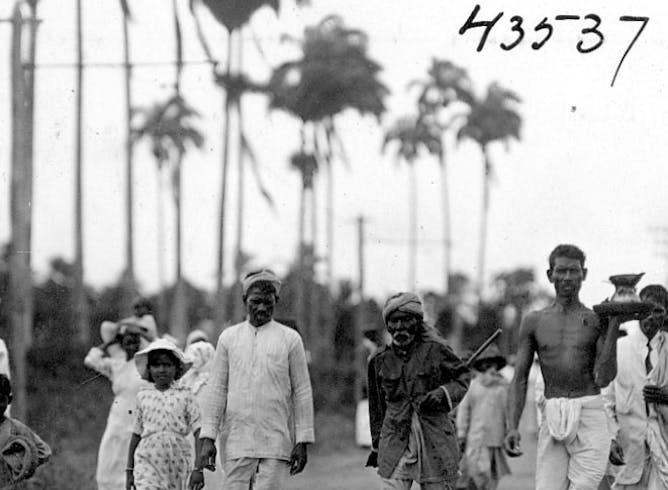|
“My father never spoke to us about Guyana, the country of his birth, when we were growing up because he believed that his history had no value to his children.” That is how Maria del Pilar Kaladeen opens our latest Insights long read which looks at how the stories of Indian indentured labourers from the Caribbean were largely forgotten in the overall Windrush narrative.
They were a minority within a minority and subsequent generations were left with little information about their pasts – about who they were. That silence would have consequences and was “like a bullet that ricocheted down generations”, Kaladeen writes. The information vacuum also helped Britain ‘forget’ its part in the creation and maintenance of the system of indenture.
The story is part of our Windrush 75 series that celebrates the “Windrush generation” and explores the pressing injustices that still face these people and their descendants.
Elsewhere, the latest story in our Plant Curious series reveals that we have something quite surprising in common with plants, fungi and even some bacteria – they all have a body clock and have the potential to get jet lag. And our
experts bring you the latest on the Ukraine conflict where the destruction of the Nova Kakhovka dam is pointing to a new phase in the war.
|

|
Paul Keaveny
Investigations Editor
|
|

Labourers and children of Indian heritage walking down a street in Guyana in the early 1920s.
The Field Museum Library
María del Pilar Kaladeen, School of Advanced Study, University of London
When people think about the Windrush generation, they are unlikely to imagine someone like my father, who was not black but a person of Indian-Caribbean heritage.
|

Rimma Bondarenko/Shutterstock
Katharine Hubbard, University of Hull
Why plants’ oscillating genes matter for humans.
|

Ukraine's Presidential Office via AP
Stefan Wolff, University of Birmingham; David Hastings Dunn, University of Birmingham
The destruction of this massive dam is a huge blow to Ukraine’s plans for a counter-offensive in the south.
|

shutterstock.
Supamotionstock.com/shutterstock
Katharina Brinkert, University of Warwick
There’s a limit to the amount of oxygen we can carry with us in space – particularly if we want to do long-haul journeys to the Moon and Mars.
|

Tartila/Shutterstock
Mario Saraceni, University of Portsmouth
Languages don’t have a beginning that can be compared to the birth of a living being.
|

Pollice Verso (With a Turned Thumb) by Jean-Léon Gérôme (1872).
Phoenix Art Museum
Wray Vamplew, University of Stirling
Death was always a possibility, but gladiator combat was controlled by referees.
|
Politics + Society
|
-
Ben Soodavar, King's College London
Now Russians may start feeling the fear that has afflicted ordinary Ukrainians since February 2022.
-
Garret Martin, American University School of International Service
The UK leader’s visit to the US comes amid trouble at home, with low ratings for his Conservative Party. But don’t expect much joy for Sunak on trade or Northern Ireland.
|
|
Business + Economy
|
-
Marianna Fotaki, Warwick Business School, University of Warwick
To win back the trust of its members, policymakers and the public, the CBI must change its culture and governance. But this is a very difficult undertaking.
|
|
Environment
|
-
Jonathan Bamber, University of Bristol
A short history of predicting an ice-free Arctic – and why you should listen to this one.
-
Sonja Fransen, United Nations University
Refugee settlements are particularly affected by high temperatures and extreme rainfall, even more so than the rest of their host countries.
|
|
Health
|
-
Amanda Ellison, Durham University
Transcranial magnetic stimulation is a safe, well-tolerated way to treat depression.
-
Christopher Gaffney, Lancaster University
Weighted vests have long been popular among CrossFit athletes and celebrities.
|
|
Science + Technology
|
-
Panagiotis Ritsos, Bangor University; Peter W. S. Butcher, Bangor University
Will Apple’s Vision Pro set the new standard for the future of virtual reality?
|
|
|
|
| |
|
|
|
|

|
19 - 30 June 2023
•
Colchester
|

|
22 June 2023
•
Birmingham
|

|
22 - 23 June 2023
•
Birmingham
|

|
|
|
|
| |
| |
| |
| |
| |
|
|